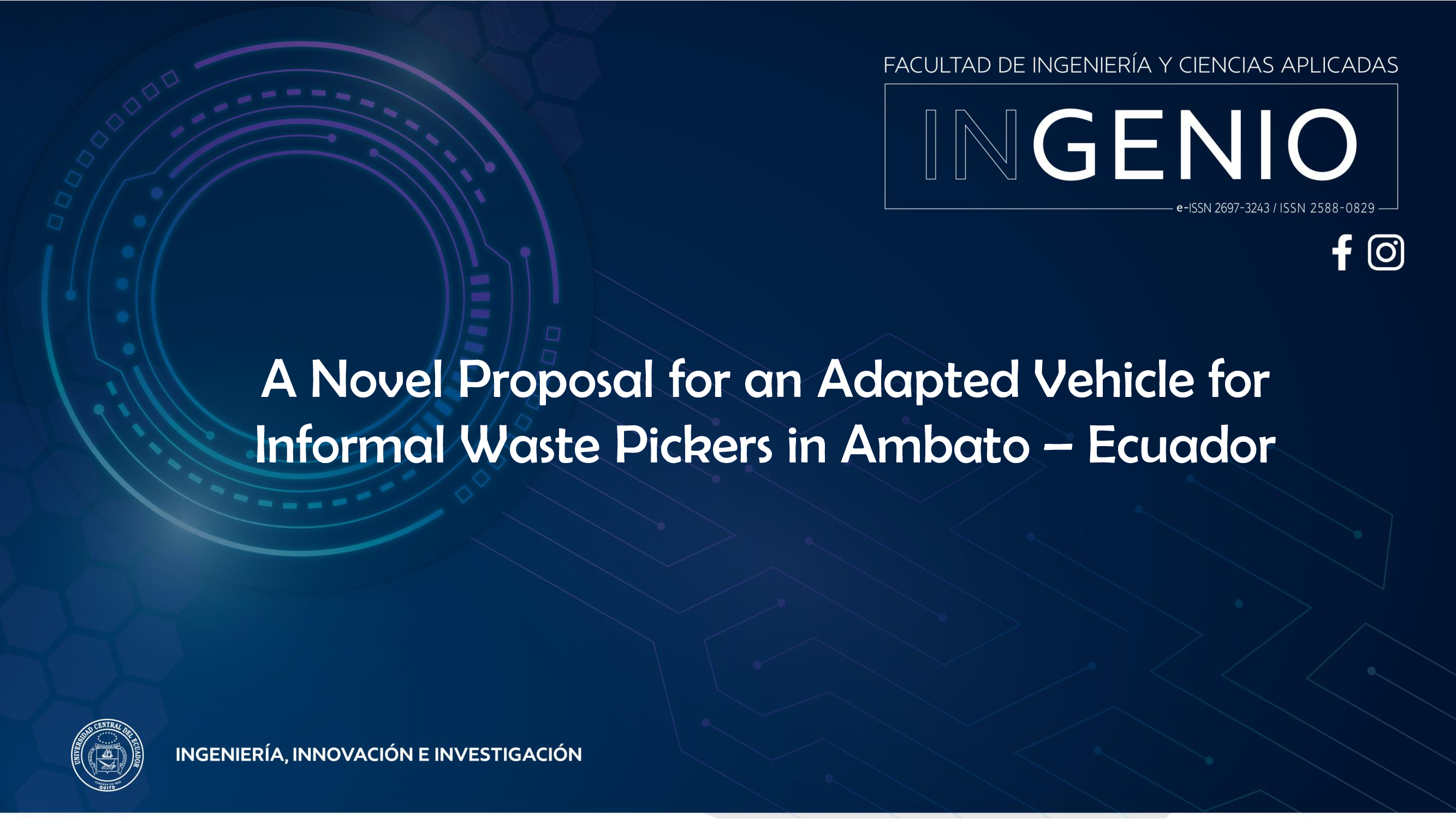A Novel Proposal for an Adapted Vehicle for Informal Waste Pickers in Ambato – Ecuador
Contenido principal del artículo
Resumen
Solid waste management represents a challenge for contemporary cities because it involves various levels of management and processing. At the base of the recycling pyramid, the crucial role of informal recyclers stands out, whose work improves the environmental conditions of cities. Despite its valuable contribution, informality has marked this profession, with deplorable working conditions at a social and economic level and low occupational safety. Recyclers roam the city in search of as much recyclable material as possible, so they can later sell it and continue the chain. However, the operational process of the recyclers is striking due to the inadequate conditions, in terms of personal protection and mobilization. Traditionally, they move with a cart, a product intended for transporting heavy loads over short distances. However, it is used by waste pickers to travel long distances during the daily working day. Through the methodology of early and continuous validation for product design, a vehicle adapted for the work of informal recyclers in the city of Ambato is proposed. It shows a valuable vision of addressing management in an inclusive, effective way for the city, with adequate working conditions at the operational level for waste pickers.
Descargas
Métricas
Detalles del artículo

Esta obra está bajo una licencia internacional Creative Commons Atribución-NoComercial-SinDerivadas 4.0.
Citas
E. Cajamarca, W. Bueno, and J. S. Jimbo, "From Zero to Money: Trash as the Primary Source for an Inclusive Recycling Business in Cuenca (Ecuador)," Rev. Sciences, Adm. and Econ., vol. 9, no. 17, pp. 71–87, 2019, doi: https://doi.org/10.17163/ret.n15.2018.05.
S. Akhtar, A. S. Ahmad, M. I. Qureshi, and S. Shahraz, "Households willingness to pay for improved solid waste management," Glob. J. Environ. Sci. Manag., vol. 3, no. 2, pp. 143–152, 2017, doi: 10.22034/gjesm.2017.03.02.003.
V. H. A. Vieira and D. Matheus, "The impact of socioeconomic factors on municipal solid waste generation in São Paulo, Brazil," Waste Manag. Beef., vol. 36, no. 1, pp. 79–85, 2018, doi: 10.1177/0734242X17744039.
P. Rebehy, A. Costa, C. Campello, D. de Dreitas Espinoza, and M. Neto, "Innovative social business of selective waste collection in Brazil: Cleaner production and poverty reduction," J. Clean. Prod., vol. 154, pp. 462–473, 2017, doi: 10.1016/j.jclepro.2017.03.173.
A. S. Oyekale, "Determinants of households' involvement in waste separation and collection for recycling in South Africa," Environ. Dev. Sustain., vol. 20, no. 5, pp. 2343–2371, 2018, doi: 10.1007/s10668-017-9993-x.
M. Gall, M. Wiener, C. Chagas de Oliveira, R. W. Lang, and E. G. Hansen, "Building a circular plastics economy with informal waste pickers: Recyclate quality, business model, and societal impacts," Resour. Conserv. Recycl., vol. 156, no. January, p. 104685, 2020, doi: 10.1016/j.resconrec.2020.104685.
C. Ezeah, J. A. Fazakerley, and C. L. Roberts, "Emerging trends in informal sector recycling in developing and transition countries," Waste Manag., Vol. 33, No. 11, pp. 2509–2519, 2013, doi: 10.1016/J.Wasman.2013.06.020.
OECD/ILO, "Tackling Vulnerability in the Informal Economy," 2019. doi: https://doi.org/10.1787/939b7bcd-en.
A HABITAT, Solid waste management in the world's cities: water and sanitation in the world's cities, 2010. London, 2010.
S. Dias, "Waste pickers and cities," Environ. Urban., vol. 28, no. 2, pp. 375–390, 2016, doi: 10.1177/0956247816657302.
D. Coletto and D. Carbonai, "What Does It Mean to Have a Dirty and Informal Job? The Case of Waste Pickers in the Rio Grande do Sul, Brazil," Sustain., vol. 15, no. 3, pp. 1–16, 2023, doi: 10.3390/SU15032337.
M. Chen and F. Carré, The informal economy revisited: Examining the past, envisioning the future, 1st ed. London: Routledge, 2020.
A. C. Ogando, S. Roever, and M. Rogan, "Gender and informal livelihoods: Coping strategies and perceptions of waste pickers in Sub-Saharan Africa and Latin America," Int. J. Sociol. Soc. Policy, vol. 37, no. 7–8, pp. 435–451, 2017, doi: 10.1108/IJSSP-06-2016-0077.
V. Iñiguez-Gallardo and P. Romero Mejía, "Perspectives of informal street waste pickers in Loja-Ecuador," IOP Conf. Ser. Earth Environ. Sci., Vol. 1141, No. 1, 2023, DOI: 10.1088/1755-1315/1141/1/012005.
J. M. Kariuki, M. Bates, and A. Magana, "Characteristics of Waste Pickers in Nakuru and Thika Municipal Dumpsites in Kenya," Curr. J. Appl. Sci. Technol., Vol. 37, No. 1, pp. 1–11, 2019, DOI: 10.9734/CJAST/2019/V37I130272.
C. Rivadeneira and P. Trujillo Montalvo, "Chains and Links of Recycling: An Ethnographic Approach to Working with Garbage," Plur Worlds. - Rev. Latinoam. Policy and Public Action, vol. 10, no. 1, pp. 175–193, 2023, doi: 10.17141/mundosplurales.1.2023.5792.
J. Hidalgo-Crespo, J. L. Amaya-Rivas, I. Ribeiro, M. Soto, A. Riel, and P. Zwolinski, "Informal waste pickers in guayaquil: Recycling rates, environmental benefits, main barriers, and troubles," Heliyon, Vol. 9, No. 9, 2023, doi: 10.1016/J.Heliyon.2023.e19775.
S. Carenzo and P. Schamber, "Inclusive Recycling and Technology Transfer Models in Argentina. Socio-technical analysis of initiatives to replace carton carts," Rev. Iberoam. Science, Technology. and Soc., vol. 16, no. 47, pp. 119–151, 2021, [Online]. Available: https://ojs.revistacts.net/index.php/CTS/article/view/233.
D. Yepes Palacio, F. A. Roldán Cardona, and J. Villaraga Ossa, "Design and Construction of a Prototype Cargo Vehicle for the Use of the Informal Recycler - A Proposal for Medellín," Rev. Polytechnic, vol. 8, no. 14, pp. 17–29, 2012, [Online]. Available: https://ojs.revistacts.net/index.php/CTS/article/view/233.
J. A. Gómez-Correa, A. A. Agudelo-Suárez, and E. Ronda-Pérez, "Social and Health Conditions of Medellín Waste Pickers," Rev. Public Health, vol. 10, no. 5, pp. 706–715, 2008, doi: 10.1590/S0124-00642008000500003.
M. Marello and A. Helwege, "Solid Waste Management and Social Inclusion of Wastepickers: Opportunities and Challenges," Lat. Am. Perspect., vol. 45, no. 1, pp. 108–129, 2018, doi: 10.1177/0094582X17726083.
Regional Initiative for Inclusive Recycling, "Inclusive Recycling and Grassroots Waste Pickers in Ecuador," 2015. [Online]. Available: https://latitudr.org/wp-content/uploads/2016/04/Reciclaje-Inlcusivo-y-Recicladores-de-base-en-EC.pdf.
S. Dias, "Integrating Informal Workers into Selective Waste Collection: The Case of Belo Horizonte , Brazil," 2011. [Online]. Available: https://www.wiego.org/sites/default/files/migrated/publications/files/Dias_WIEGO_PB4.pdf.





